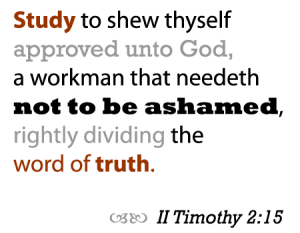Enter “punctuation in the Bible” on your search engine and sit back to read the educated ignorance that twitters throughout the world wide web. The general consensus is that punctuation is whatever whenever you want it to be (partly true) and that the King James Bible is the most infamous punctuation felon in all literature of all ages. There’s nothing new or surprising in that opinion; it has circulated since the Garden. After all, the Book claims to be the word of God, and that idea went out the window shortly before the first murder occurred. Men have been killing, robbing, raping, pillaging, starving, and plundering one another by the most obvious and devious means ever since natural selection has led us on the rose strewn path of evolution. What deluded nut could ever think punctuation was correct, when the very words are outdated, confusing, and the whole book is a sham!
Within this turmoil, there is another line of history. Grandma said: “The proof is in the puddin” and it speaks for itself. The relatively few people that believe the Bible have produced more real benefits in a mad world than all the rapping critics combined. It is a proven fact of life that social order and decent treatment of each other win out every time. And, it is true that the person who diligently strives to live by the word of God has “meat to eat” that the majority of the world knows nothing about.
Punctuation in English is nothing more than an earnest attempt to be orderly and clear in our writing. We want the reader to understand what we write. Those who have made language study a lifetime pursuit agree in a majority that the King James Bible is the masterpiece of all literature. The proof is in the “puddin” and all those who study its words, sentences, as well as punctuation, find the Bible is fresh air in a polluted world.
No bones about it, I am one of those who found that the Bible changes a man, inwardly and outwardly. Anything that can do that is worthy of notice. By no means one who knows it all, I do know that whereas I once was blind, now I see. Better, smarter, wiser than all the rest of men? No. I am just a sinner, saved by the grace of God and trying to serve Him.
Beyond the normal use, one of the most useful tools of study in the King James Bible is an unusual insertion of punctuation. (I call it “predictive punctuation” for lack of a better term.) Although modern punctuation experts (they change their rules every decade) make light of the “old fashioned” punctuation, the King James Bible sets the rules by its context and teaches thereby. The comma and period is nowhere illustrated more vividly than in Luke 4 with Isaiah 61.
“17 And there was delivered unto him the book of the prophet Esaias. And when he had opened the book, he found the place where it was written,
18 The Spirit of the Lord is upon me, because he hath anointed me to preach the gospel to the poor; he hath sent me to heal the brokenhearted, to preach deliverance to the captives, and recovering of sight to the blind, to set at liberty them that are bruised,
19 To preach the acceptable year of the Lord.
20 And he closed the book, and he gave it again to the minister, and sat down. And the eyes of all them that were in the synagogue were fastened on him.
21 And he began to say unto them, This day is this scripture fulfilled in your ears.”
(Luke 4:17-21 KJB)
The place the Lord “found” in Isaiah is interesting because there were no chapter, verse, and punctuation marks to help him locate Isaiah 61. His deliberate choice of where to stop reading at an unexpected place is another of many dispensational proofs in the Bible.
“1 The Spirit of the Lord God is upon me; because the Lord hath anointed me to preach good tidings unto the meek; he hath sent me to bind up the brokenhearted, to proclaim liberty to the captives, and the opening of the prison to them that are bound;
2 To proclaim the acceptable year of the Lord, and the day of vengeance of our God; to comfort all that mourn;
3 To appoint unto them that mourn in Zion, to give unto them beauty for ashes, the oil of joy for mourning, the garment of praise for the spirit of heaviness; that they might be called trees of righteousness, the planting of the Lord, that he might be glorified.”
(Isaiah 61:1-3 KJB)
Several items should be noted: the Book of Isaiah had no chapter, verse, or punctuation to help Jesus find the passage, so His knowledge of the book was evident. The selection of this comprehensive passage covers so many events, an extended period of time to accomplish all in the chapter must be understood. When the Lord stops reading, He stops in the middle of a statement and by this action puts a period–a full stop– right in the midst of several consecutive events.
“2 To proclaim the acceptable year of the Lord, (JESUS STOPPED READING RIGHT HERE) and
the day of vengeance of our God; to comfort all that mourn;”
A normal reading would demand the full passage, at least through verse 3 of Isaiah. We notice that verses 1-3 covers one statement. The first period placed by English translation in Isaiah 61 is at the end of verse 3. There are commas and semi-colons throughout to indicate a short pause in thought or expansion of the previous action, but there are no periods until verse 3 where the Person of verse 1 is said in verse 3 to “to be glorified.” No one can argue successfully that the Isaiah English punctuation is wrong. But in Luke, God changes the program, or inserts by the period the possibility of a longer time between “To proclaim the acceptable year of the Lord” and “the day of vengeance of our God”.
In Isaiah, as it was written, it appears that all the events from v. 1 through v. 11, the entire chapter, will happen in consecutive fashion with no long delays. When the Lord, hundreds of years later closes the book with a period, that changes it all.In Luke 4 the Lord’s actions are detailed. After He finishes the reading, He closes the book, He hands the book back again to the minister, He sits down and begins to say “This day is this scripture fulfilled in your ears.” Luke does not record the remaining words after He “begins to
say.” There can be no doubt that a tremendous change has been made by His actions. It is like saying, the choice has been made and now it is up to you (Israel) what you do with it. The word was fulfilled in their “ears” and it is noteworthy from the remaining Gospel account that the word of God went no farther than these leaders’ ears.
As revelation of God’s purpose and plan unfolds in the rest of the New Testament, we learn that Israel rejects Christ during “the acceptable year of the Lord,” and the present Church Age is an indeterminate time between that day and “the day of vengeance of our God.” (The Tribulation period and following) The comma in Old Testament prophecy has been changed to a period. Now that we have a complete Bible, we know the period is there between “acceptance” and “vengeance” for two reasons.
- Had Israel accepted the Lord, the promised blessings would have come upon Israel right then and the vengeance would have been poured out upon those that failed to heed their calling and message. But as of Luke 4, Israel’s leaders were hesitant to even believe the forerunner, John the Baptist. What would they do with their King later on, was evident.
- It was not revealed in Isaiah or Luke that a different age (Church) would intervene between the two days until Paul was given that revelation after the Lord was rejected. Israel failed the day to accept the Lord and was cut off from blessings. After this intervention of the Church Age, Israel will see the vengeance of the Lord in that day, also known as “the day of Jacob’s trouble.” After the Tribulation, Isaiah’s prophecy that God would comfort those that mourn in Zion and deliver them, will be completely fulfilled to the letter in the Millennial Kingdom–fulfilling the comma and the period.
When we read prophetic passages in either the Old or New Testament, the comma most likely indicates a simple change in thought or descriptive terms. But from this example we learn that a comma may also mark off an unrevealed period of time between two events during which unknown or unrevealed things happen; this is indeed the case in several instances.

